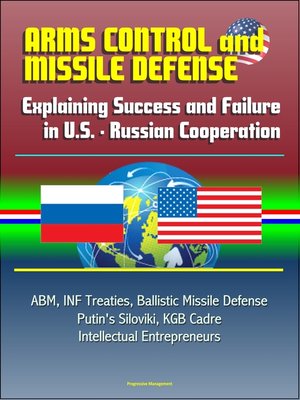Arms Control and Missile Defense
ebook ∣ Explaining Success and Failure in U.S.--Russian Cooperation--ABM, INF Treaties, Ballistic Missile Defense, Putin's Siloviki, KGB Cadre, Intellectual Entrepreneurs

Sign up to save your library
With an OverDrive account, you can save your favorite libraries for at-a-glance information about availability. Find out more about OverDrive accounts.
Find this title in Libby, the library reading app by OverDrive.



Search for a digital library with this title
Title found at these libraries:
| Library Name | Distance |
|---|---|
| Loading... |
This report has been professionally converted for accurate flowing-text e-book format reproduction. Russia can no longer be considered a world superpower, but it remains a great power in terms of strategic global security. Russia's importance is based on its nuclear arsenal and permanent seat on the United Nations Security Council. This research analyzed arms control and ballistic missile defense (BMD) in order to explain the success and failure of cooperation between the United States and the Russian Federation. Utilizing international relations theory, realist and constructivist frameworks were applied to two separate case studies: U.S.-Soviet cooperation on the Intermediate Nuclear Forces Treaty and U.S.-Russian failure to cooperate on BMD.Each case was started with material factors that opened the opportunity for the Soviet and Russian Federation elite to be responsive to new ideas. The elite then turned to the state's intellectual entrepreneurs to find new ideas. In the case of the Soviet era, the elite chose to cooperate due to the influence of the international organizations they were associated with. In the present day, the elite, many of whom have a background in the Soviet and Russian Federation secret service, have chosen to defect from cooperation due to the socialization received during their time as KGB or FSB officers.Soviet elites chose to cooperate with the United States because of the international organizations they were involved with provided the elite with ideas to implement economic reform that lead to cooperation with the west on arms control. President Vladimir Putin and the current cadre of intellectual entrepreneurs chose to follow a different path. The failure to cooperate, while based on material deficiencies, is due to current Russian intellectual entrepreneurs association with organizations whose purpose in the past was the strategic and political safety of the ruling party. In 2006 the number of people with a background in the security services (KGB, FSB, or armed forces) had reached 77 percent of Russia's top 1,016 governmental positions. The background of these new ruling elite has shaped how they respond to material and external threats to the Russian state.







